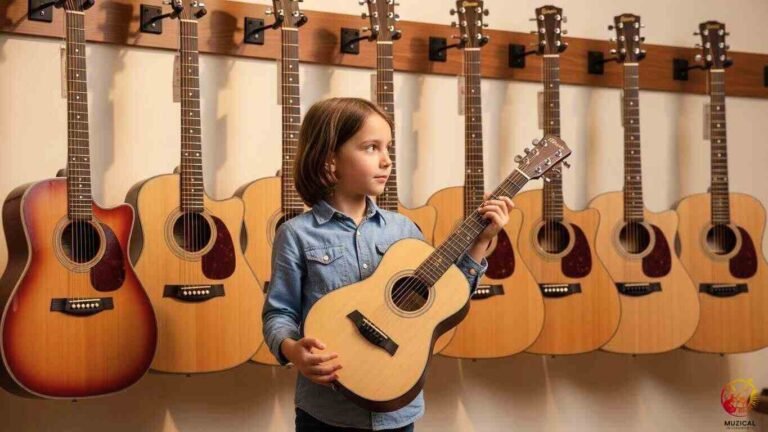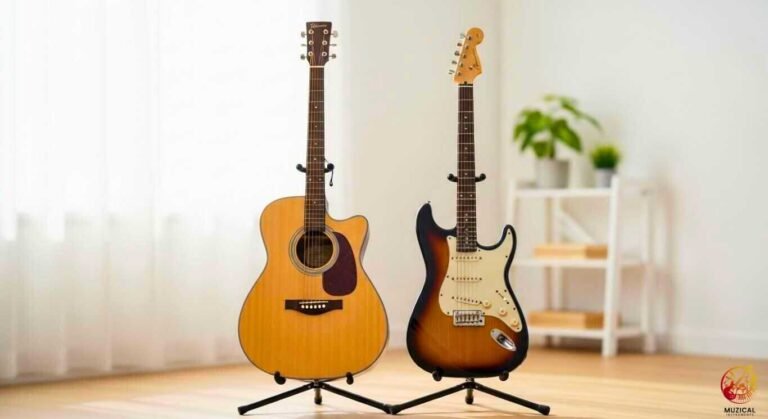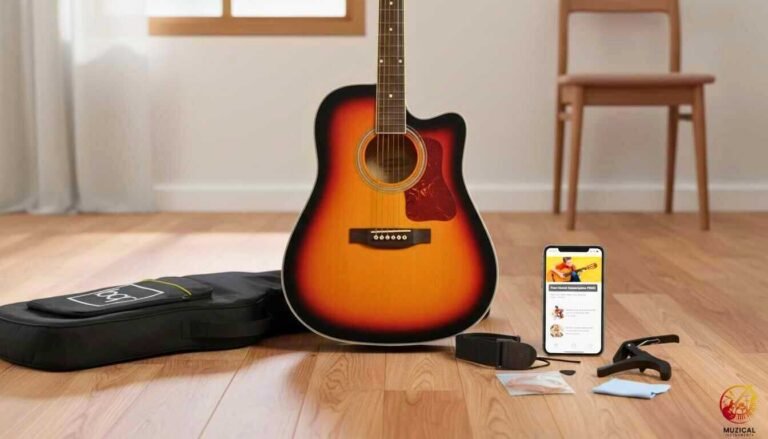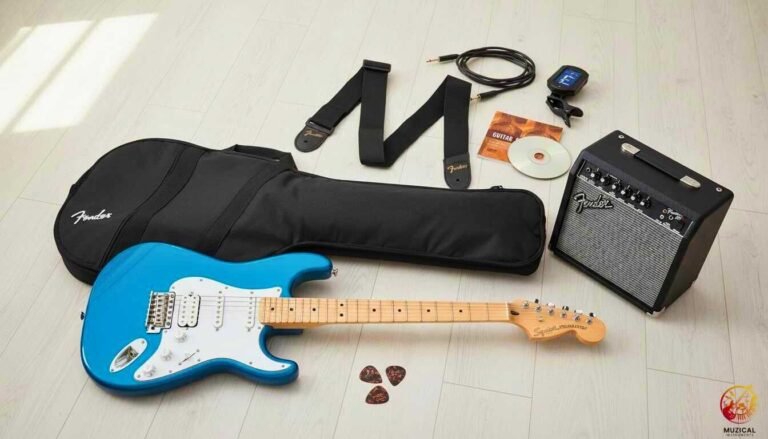Are Resonator Guitars Weatherproof? Your Complete Guide to Playing Outdoors
Are resonator guitars weatherproof? This question hits home for any dobro player planning outdoor gigs or beach jam sessions. The short answer is no, these instruments aren’t fully weatherproof like a plastic ukulele might be. But they do handle weather better than most acoustic guitars.
These unique instruments mix metal cones with wooden bodies. This creates special challenges when weather changes. Rain can damage the wood. Heat makes the metal parts expand. Cold makes them shrink. Humidity swells the wood while the metal stays the same size.
You need to know how weather affects your resophonic guitar before you take it outside. This guide covers everything from humidity problems to temperature swings. You’ll learn which dobro types work best outdoors and how to protect your instrument.
We’ll also share maintenance tips that keep your resonator guitar playing great in any climate.
How Do Weather Changes Affect Resonator Guitars?
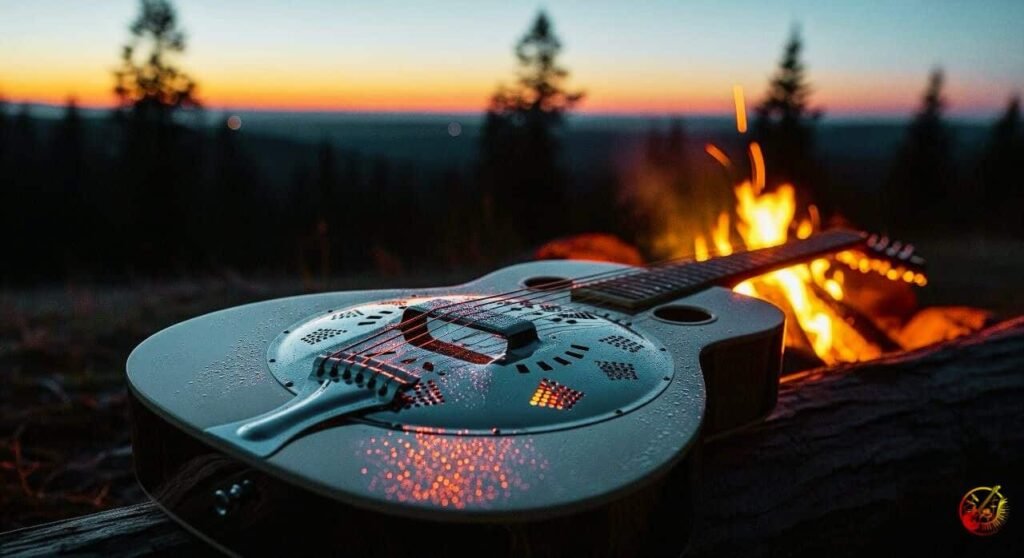
Resonator guitars face unique weather challenges because they combine different materials. The metal resonator cones react differently to weather than the wooden body around them. This creates tension points where problems can start.
Temperature changes affect metal and wood at different rates. When it gets hot, the aluminum or brass cone expands faster than the wooden body. Cold weather does the opposite. The metal shrinks quicker than the wood. This can make your guitar sound different or create buzzing noises.
Humidity hits the wooden parts hardest. High humidity makes wood swell. Low humidity makes it shrink. Meanwhile, the spun metal cone stays the same size. This creates stress where the cone meets the wood. Some players notice their dobro sounds tight in dry weather and loose when it’s humid.
The tricone and single cone designs both have these issues. Professional players often notice their instrument sounds brighter in cold weather. The metal gets stiffer, which changes the tone. Hot weather can make the sound warmer but less clear.
Are Resonator Guitars Better Than Regular Acoustics in Bad Weather?
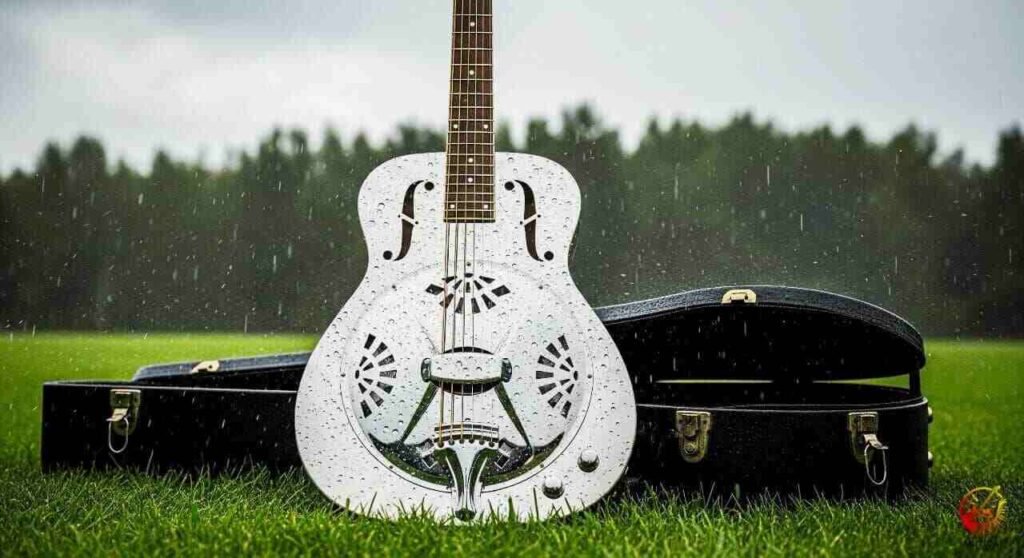
Are resonator guitars weatherproof compared to regular acoustic guitars? They do have some advantages. The metal cone doesn’t absorb moisture like a wooden soundboard does. This means less chance of warping or cracking in that critical area.
The hybrid design actually helps in some situations. If the wooden body gets a small crack, the metal cone can still work fine. With a regular acoustic guitar, any crack in the top affects the whole sound. But dobro guitars rely more on the metal cone for their voice.
Both biscuit bridge and spider bridge systems resist weather better than all wood guitars. The metal parts transfer vibrations to the cone instead of relying only on wood. This gives you backup sound projection even if the wooden body has minor weather damage.
However, resonator guitars aren’t magic. They still have wooden bodies that can crack in dry weather or swell in humid conditions. The neck is still wood and can warp just like any guitar neck. String action can change with weather just like on regular guitars.
What Temperature Changes Hurt Your Dobro Guitar Most?
Extreme temperature swings cause the biggest problems for dobro guitars. Moving from a cold car trunk to a hot stage in summer can stress your instrument. The metal and wood parts adjust at different speeds, creating temporary problems.
Cold weather makes metals brittle and can affect how the cone vibrates. Really cold temperatures might make your guitar sound harsh or metallic until it warms up. Hot weather creates different issues. The metal cone gets more flexible, which can make the sound warmer but less focused.
| Temperature Range | What Happens | What You’ll Notice |
|---|---|---|
| Below 40°F | Metal gets stiff | Sharp, bright tone |
| 40-75°F | Everything works normally | Normal sound |
| Above 85°F | Metal gets flexible | Warmer, less focused tone |
The worst situation is rapid changes. Going from air conditioning to hot sun in minutes shocks your instrument. Professional players let their guitars adjust gradually. They keep instruments in cases until showtime, then allow 15-20 minutes for temperature adjustment.
Some touring musicians use thermal cases that slow down temperature changes. These cases have extra padding that keeps the inside temperature steady longer.
Can High Humidity Damage Your Resonator Guitar?
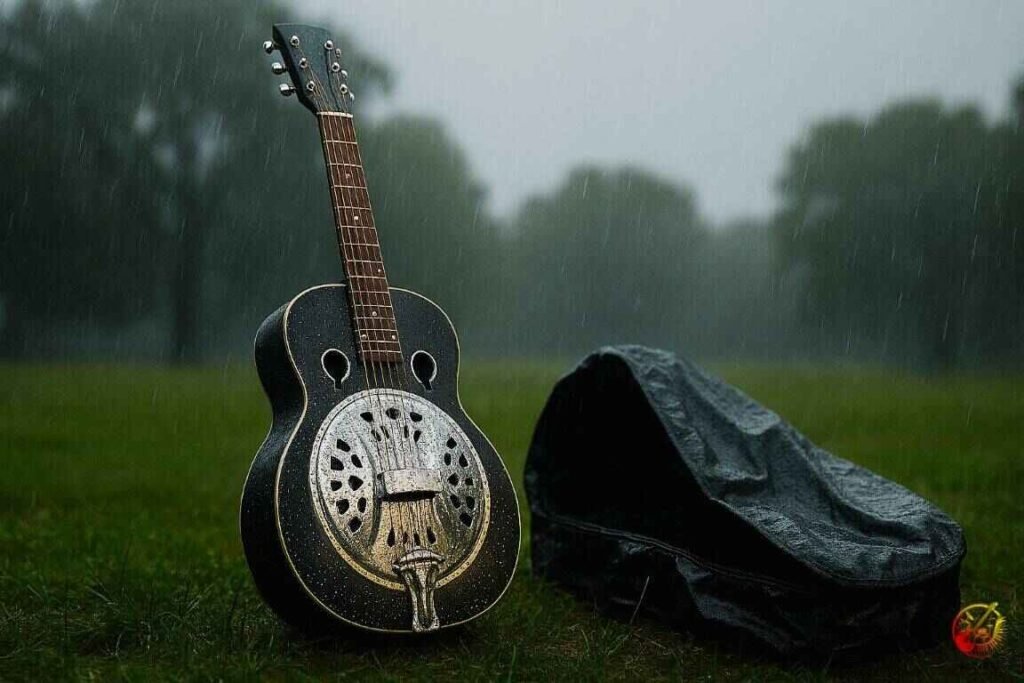
Humidity creates serious challenges for any wooden instrument. Are resonator guitars weatherproof against moisture? Not really. The wooden body still absorbs water from humid air and releases it in dry conditions.
High humidity makes the wooden body swell while the metal cone stays the same size. This can push the cone out of its proper position. You might hear new buzzes or rattles as parts that normally don’t touch suddenly do.
Low humidity creates different problems. The wood shrinks while the metal stays put. This can create gaps around the cone mounting or change the neck angle. Really dry conditions can crack the wooden body.
The ideal humidity for any dobro guitar is between 45-55%. Most players use small meters to check their guitar cases. Simple case humidifiers work well for dry climates. For humid areas, small moisture absorbing packs help keep levels down.
Coastal players face special challenges from salt air. The metal parts can eventually rust if exposed to salt regularly. Regular cleaning becomes more important near oceans.
Which Resonator Guitar Types Handle Weather Best?
Not all resonator guitars are equal when it comes to weather resistance. Are resonator guitars weatherproof? It depends on how they’re built. All metal bodies like those from National or some Dobro models handle weather best.
Steel body resonator guitars solve wood expansion problems completely. Both the body and cone are metal, so they expand and contract together. These guitars work great for outdoor festivals or touring where you face different weather constantly.
Wood bodied instruments with laminated construction beat solid wood for weather resistance. The plywood layers move less with humidity changes than solid wood pieces. Many guitars from Recording King or Epiphone use this construction.
| Guitar Type | Weather Resistance | Best For |
|---|---|---|
| All-metal body | Excellent | Outdoor venues, touring |
| Laminated wood body | Good | Mixed indoor/outdoor |
| Solid wood body | Fair | Studios, indoor venues |
Tricone designs often handle weather better than single cone guitars. The three smaller cones distribute stress better than one large cone. Companies like Beard Guitars make excellent tricones for tough conditions.
The quality of metal parts matters too. Chrome plated hardware resists rust better than raw brass or steel. Sealed tuning machines keep moisture out. Better bridges maintain their fit through weather changes.
How Do You Protect Your Dobro Guitar During Outdoor Shows?
Smart preparation keeps your resonator guitar safe during outdoor performances. Even the most weather resistant dobro needs protection from direct rain, blazing sun, or strong winds.
Hard shell cases with good seals provide the best protection. Foam padding prevents damage, while weather seals keep moisture out. Some cases include humidity control systems that maintain steady conditions inside.
Stage setup makes a huge difference. Position yourself away from direct sun when possible. Even covered stages can expose instruments to temperature extremes. Strong winds can cool instruments quickly or blow dust into sensitive parts.
Keep clean clothes handy for wiping moisture off metal parts. Small battery powered fans help air circulation in humid conditions. Many pros carry backup instruments specifically chosen for weather resistance.
What Maintenance Do You Need After Weather Exposure?
Post gig maintenance becomes critical after exposing your dobro guitar to challenging weather. Proper care right after weather exposure prevents long term damage.
- Start with a visual check for obvious problems.
- Look for moisture around the cone, tuning machines, and inside sound holes.
- Check for any new cracks on the wooden body.
- Wipe down all metal surfaces with a dry cloth.
String care needs extra attention after weather exposure. Humidity and temperature changes affect string tension and can speed up rust. Wipe strings down after playing and consider changing them more often if you play outdoors regularly.
| Maintenance Task | When to Do It | What You Need |
|---|---|---|
| Visual inspection | After every outdoor show | Good lighting |
| Metal cleaning | Weekly with regular outdoor use | Soft cloths |
| Humidity check | Daily in extreme climates | Small meter |
Store your instrument properly after weather exposure. Let it adjust gradually to indoor conditions instead of putting it directly near heating or cooling vents. This prevents shock from rapid temperature changes.
Do Professional Players Use Special Weather Techniques?
Professional dobro and resonator guitar players develop specific strategies for handling weather challenges. Many touring musicians consider weather protection as important as amplification.
Case selection becomes crucial for working players. Some invest in flight cases with humidity control for airline travel. Instrument rotation is common among pros. They might own a steel body National for outdoor festivals and a premium solid wood instrument for recording.
Temperature preparation becomes routine. Smart players arrive early at outdoor venues to let instruments adjust gradually. They keep guitars in cases until needed, then allow adjustment time before sound checks.
Some touring players use weather apps on their phones to track humidity and temperature. This helps them predict when their instruments might need special attention.
Final Thoughts
Are resonator guitars weatherproof? No, but they can handle outdoor conditions better than many acoustic instruments when you understand their limits and take proper care. The key is knowing how weather affects both metal and wood parts differently.
Success comes from choosing the right guitar for your conditions, using proper protection, and maintaining good care habits.
Steel body instruments work best for extreme weather, while wood bodied guitars need more attention but offer richer tones.
Your resonator guitar can provide reliable outdoor performance for years when you respect its weather limitations. Whether you’re playing blues at a festival or folk music around a campfire, the right preparation keeps your dobro sounding great through any weather challenge.
FAQ: Are Resonator Guitars Weatherproof?
1. Are resonator guitars weatherproof or waterproof?
Resonator guitars are not waterproof or fully weatherproof. While the metal cones resist moisture better than wooden soundboards, the wooden body can still be damaged by rain, humidity, and temperature changes. The metal components help these guitars handle weather slightly better than regular acoustic guitars, but they still need protection from direct water exposure and extreme conditions.
2. Can I play my dobro guitar outside in the rain?
No, you should never play a resonator guitar in direct rain. Water can damage the wooden body, seep into cracks, cause finish problems, and create long-term issues with both metal and wood components. Light mist might be okay for very short periods, but any significant moisture exposure requires immediate drying and inspection of your instrument.
3. How does humidity affect resonator guitars?
Humidity affects resonator guitars by making the wooden body swell or shrink while the metal cone stays the same size. High humidity causes wood expansion that can push the cone out of position, creating buzzes or rattles. Low humidity shrinks the wood, potentially creating gaps around the cone or causing cracks. The ideal humidity range is 45-55% relative humidity.
4. Do metal-body resonator guitars handle weather better than wood-body ones?
Yes, all-metal resonator guitars like steel-body National guitars handle weather much better than wood-bodied instruments. Since both the body and cone are metal, they expand and contract together, eliminating the stress points that occur between different materials. Metal-body guitars are the best choice for regular outdoor playing or touring in various climates.
5. What temperature changes can damage my resonator guitar?
Rapid temperature changes of more than 30-40 degrees Fahrenheit can stress your resonator guitar. The biggest problems occur when moving quickly from cold to hot environments (like from an air-conditioned car to a hot stage). Extreme cold makes metal brittle and can affect cone vibration, while extreme heat makes metal expand faster than wood, potentially causing fit issues.
6. Should I use a humidifier with my dobro guitar?
Yes, you should monitor and control humidity around your resonator guitar, especially in dry climates or heated indoor environments during winter. Use case humidifiers when humidity drops below 40%, and moisture-absorbing packs when it rises above 60%. Small hygrometers help you track conditions and prevent damage from humidity extremes.
7. Can I leave my resonator guitar in a hot car?
Never leave your resonator guitar in a hot car. Temperatures inside vehicles can reach 140°F or higher, which can crack wooden bodies, damage finishes, warp necks, and affect the metal cone’s fit. The rapid temperature changes when removing the guitar from extreme heat can also shock the instrument and cause immediate tuning problems.
8. How do I protect my resonator guitar during outdoor performances?
Protect your resonator guitar outdoors by using a quality hard case for transport, positioning yourself away from direct sun and wind, keeping microfiber cloths handy for wiping condensation, allowing 15-20 minutes for temperature adjustment before playing, and having backup instruments for extreme weather conditions. Many professionals use steel-body guitars specifically for outdoor venues to avoid weather risks with their premium wood-bodied instruments.

